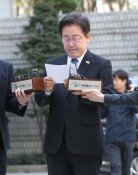How Japanese Diplomats Got Appointed to Top Int`l Posts
How Japanese Diplomats Got Appointed to Top Int`l Posts
Posted July. 06, 2009 10:13,
The appointment of Yukiya Amano as the next chief of the International Atomic Energy Agency is attributed to Japans economic power, a large number of overseas personnel, and an efficient diplomatic system.
The long-term and thorough diplomatic strategies of Japan have played a bigger role in helping its diplomats assuming the top posts at the International Court of Justice, the International Energy Agency and the Asian Development Bank.
○ Powerful diplomatic line-up
Since Japan sent its first diplomat to the United Nations in 1957, it has deployed a host of nationals to international organizations, creating a wide human network on the global stage.
Yasushi Akashi worked at the U.N. for 40 years and held key positions such as undersecretary-general of public information. Sadako Ogata began working at the U.N. as Japans top adviser in 1968 and served as the U.N. High Commissioner for Refugees from 1991 until 2001.
Koichiro Matsuura is another veteran diplomat of 50 years and has been director general of the U.N. Educational, Scientific and Cultural Organization, or UNESCO, for 10 years.
New IAEA chief Amano had been in charge of arms control and nonproliferation at the Japanese Foreign Ministry, indicating that Tokyo trained him for his latest position.
Given Japans economic power, the influence and number of its diplomats have also increased, many of whom have taken key positions at international organizations.
○ Diplomacy backed by personnel, funds and back-up plans
Amanos appointment was possible thanks to Japans aggressive efforts based on its strong human network. With North Korea threatening to become a nuclear state, Japan has a particular interest in the agencys top position, Japanese Prime Minister Taro Aso apparently did everything necessary to help Amano win the appointment by the agencys board of governors.
Tokyo is said to have boosted Amanos bid by offering rewards to developing countries in return for their support.
Cooperation between the government and private sector is another contributing factor for Japans growing presence in world bodies. The basic principles of the Japanese Foreign Ministry in helping Japanese companies operating abroad are strengthening cooperation and sharing of information and human networks between overseas missions and companies.
The ministry has 2,200 officials in Japan and 3,300 abroad, three times larger than South Koreas diplomatic corps (900 and 1,100 respectively).
The budget for the Japanese Foreign Ministry this year is 670 billion yen (seven billion U.S. dollars), of which 436.3 billion yen (4.6 billion dollars) is for overseas assistance. Japan is the second-largest contributor to international organizations, including the U.N., after the United States.
Based on such large contributions, Japan seeks a bigger say in the international community. As of 2007, 108 Japanese nationals worked at the U.N. and its affiliates, ranking fifth in the number of staff following the United States and Germany.
Moreover, Japan has set up a personnel center for international organizations and aims to increase its number of U.N. staff to 300. The country has also sent more than 100 volunteer workers to the world body.
To take the top post at the worlds top nuclear watchdog this year, when the agency held its election for director-general, Tokyo allocated 16 billion yen (167 million dollars) for projects on arms control, nonproliferation and the peaceful use of nuclear power.
After the election, Japan began follow-up moves to expand its influence, expressing its willingness to provide nuclear power technology to the international community.
○ Bid for U.N. Security Council permanent membership
One of the ultimate goals of Japans diplomacy is to earn a permanent seat on the U.N. Security Council to get a bigger voice in international affairs befitting its economic power. This is why Tokyo is urging the councils expansion.
Permanent council members Britain and France back Japans bid and the United States is also signaling its support to that end. The appointments of Japanese diplomats to top posts at international organizations are part of Tokyos efforts to achieve this goal.
To further expand its international influence, Japan formed diplomatic ties with Tonga, Latvia, Georgia, and Burkina Faso this year.
jkmas@donga.com







